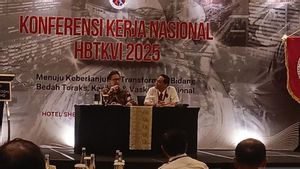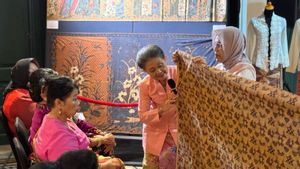JAKARTA - The COVID-19 pandemic that has spread in Indonesia has forced the government to cancel the National Examination (UN). Actually, even if there was no pandemic, the majority of people agreed that the UN would be better eliminated. For a long time, the National Examination has been an annoying specter for the participants. There are many reasons for this.
Apart from being only a means of fraudulent practice, the National Examination is also arguably useless. After all, selection to enter schools to higher levels is no longer based on UN scores, but on a zoning system. Moreover, for those who want to enter college. Which campus also makes the UN results as a benchmark for entry selection?
Even so, it is clear that there must be a new educational assessment system that must be improved immediately if you really want to eliminate the UN, including the National Standard School Examination scheme as a substitute for the recently echoed UN. However, if you explore how the scourge of the National Examination is for students - especially high school level students who immediately go to college, the UN is actually nothing compared to the Suneung exam in South Korea.
The first comparison is that the National Examination in Indonesia is not used as a standard for college entrance selection. In addition, there are many entrance test paths for admission to tertiary institutions. Starting from the written test together, tests using the average report card scores, to independent tests. It's a different story with students in Ginseng Country, where the Suneung exam is arguably the gateway to the next life.
South Korea's national scale final exam, called Suneung or College Scholastic Ability Test (SCAT), might be said to be a determination of the future life and death of South Korean youth. The reason is, the eight-hour marathon exam not only determines whether students can enter the university, but also can affect job prospects, income, where they will live and even affect future relationships.
"For us, Suneung is a very important gateway to the future. In Korea, getting into a university is very important. That's why we spent 12 years preparing for this one day," said Ko Eun-suh, a student who took the Suneung exam for the first time. from the BBC.
Every year in November, Suneung brings all the country's activities to a halt. When this exam was held, silence could be felt all over the capital, Seoul. Instantly, shops close, banks close. In fact, the stock market opens late at night. In addition, most of the construction work also stopped, planes were grounded, and military training was halted.
Sometimes the silence of the city is broken by the sound of sirens from police motorbikes racing to escort late students to their exams. If in Indonesia when going to the UN, usually the students hold a joint istigosah, a similar thing also happened in South Korea. There, many parents are so nervous that they spend a day at a Buddhist temple or local Christian church, holding photos of their children and praying that their child will pass the decisive test.
So, naturally, Suneung became a scourge. Apart from the problem which is considered very difficult, the making of the exam questions is also shrouded in mystery. Every September, about 500 teachers from all over South Korea are selected and taken to a secret location in one of the mountainous Gangwon provinces. For one month, the teachers were quarantined, their phones were confiscated and all contact with outsiders was prohibited.
After the exam is over, the score will officially be announced via the national website one month later. However, unofficial sites that leak their test scores usually appear sooner, so students can immediately compare their total score with the minimum score required to enter the university of their choice.

High stress levels
The intense competition, long learning and mental preparation before exams, to the cost of a lot to be spent on tutoring costs, undoubtedly causes stress for students. Therefore, criticism of Suneung about the mental impact of students was widely voiced.
Still citing the BBC, a psychologist working in Seoul Kim Tae-hyung said South Korean children were forced to study hard and compete with their peers. "They grew up alone, just learning on their own. This kind of isolation can lead to depression and is a major factor in suicide," said Kim.
Globally, suicide is the second leading cause of death among young people. However, in South Korea, suicide is the number one cause of death for young people aged 10-30 years. The country also has the highest levels of stress among young people aged 11-15 years compared to any other industrialized country in the world according to the Organization for Economic Cooperation and Development (OECD).
Kim said the pressure on South Korean people to get into the best universities and get good jobs had even started early. "Kids feel nervous from a young age. Even first-year elementary students are already talking about which jobs pay the most," said Kim.
Meanwhile, sociology lecturer from Yonsei University, Lee Do-hoon criticized his nation's obsession with educational achievement. In fact, on the other hand, the problem of unemployment is increasing. Ironically, these two cases are the main reasons why many young people in South Korea are struggling so hard, that many have ended up stressing themselves out.
"I think the high suicide rate is also driven by the growing gap between the lack of job opportunities, and students' own expectations of success," Lee said.
However, many experts say that educational pressure is not the only cause of high suicide rates. Rapid urban growth, as well as a decrease in the level of close kinship, were two factors that were associated with increased feelings of isolation, depression and suicide.
The English, Chinese, Japanese, Arabic, and French versions are automatically generated by the AI. So there may still be inaccuracies in translating, please always see Indonesian as our main language. (system supported by DigitalSiber.id)









